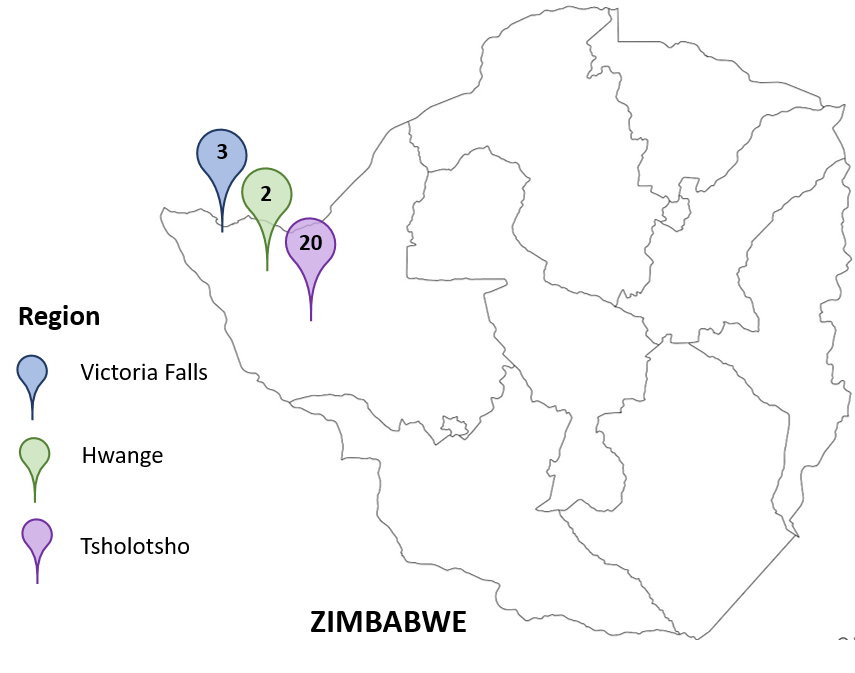Africa
Looking back on water access in Zimbabwe
In recognition of World Water Day for 2021, we reflect on the value of water, the benefits that boreholes bring, and all that Grand Circle Foundation has contributed to water needs in rural Zimbabwe.
Water is life. We need it for numerous daily tasks, and for many, we can turn a faucet on and off when we need it, and get as much water as we want. However, for millions around the world, this is far from reality. Walking several miles to collect water with a two gallon bucket, waiting in a queue, expending energy at a hand pump, and walking several miles home again is a daily routine that can take hours. Thus, easier accessibility to water is life changing.
Drilling boreholes close to communities and equipping these with solar pumps is something that GCF has strived to do over the years. To date, GCF has drilled 20 boreholes in Zimbabwe, and has upgraded a further five from hand-pumps to solar. These are plotted on the map below.

Boreholes and easy access to water provides countless benefits to those who use them. Some of these benefits include:
- Greater efficiency in everyday tasks. Having a solar borehole close to schools and homesteads can save hours during a typical day, as people no longer need to walk long distances for a small amount of water. This frees up time to do other tasks, such as income-generating groups and agriculture/tending to crops for a better yield. A solar-powered borehole in the Jabulani community garden, for example, has significantly impacted the crop yields. The vegetable garden was started almost a year ago, and has gone from strength to strength.
- Gender equality. The task of collecting water often falls on women and girls. Many girls miss out on valuable learning time at school because of water collection. A borehole close to homesteads ensures that girls have an equal opportunity with boys to attend school and gain an education.
- Community cohesion. Community cohesion is increased as members have to work together, taking ownership of the borehole. This added responsibility encourages the community to work collaboratively and ensure that it is looked after.
- Livestock and subsistence farming sustenance. Access to water provides for livestock and greatly assists with subsistence farming. In these remote areas, rainfall is sparse and unpredicatable, making it difficult to maintain a consistent livelihood. Ensuring that animals and crops have the water they need to survive ensures that livelihoods are able to be maintained.
- Health and hygiene. As water from a borehole is clean, the risk of disease-spread is much lower. Improved access to water also enables improved personal hygiene as there is more readily available water for bathing and washing hands more frequently – particularly in times such as Covid-19.
Achievement of The United Nations’ Sustainable Development Goals (SDGs). Having access to clean water through a borehole also helps contribute to many of the SDGs. Of the 17 SDGs, access to clean water gained through a borehole directly contributes to the improvement of five of them: ‘poverty alleviation’, ‘good health and wellbeing’, ‘gender equality’, ‘water and sanitation’, and ‘reduced inequalities’. Boreholes also indirectly contribute to achieving other goals such as ‘quality education’ through further education of children and the wider community, ‘decent work and economic growth’ through livelihood assistance, and ‘life on land’ through being able to look after livestock.
Community members continue to express their gratitude at having access to clean water through the boreholes that GCF has provided. It was aptly put by one: “water is life. We had many problems before, like walking long distances to find water for ourselves, our animals, and our plants. When the water came, life came. Thank you, thank you, thank you.”
Improving access to water through boreholes has significantly improved the lives of thousands in Zimbabwe. We are hugely grateful to GCF for their unwavering and continued support over the years, and are proud to be able to see the impacts of their work firsthand.